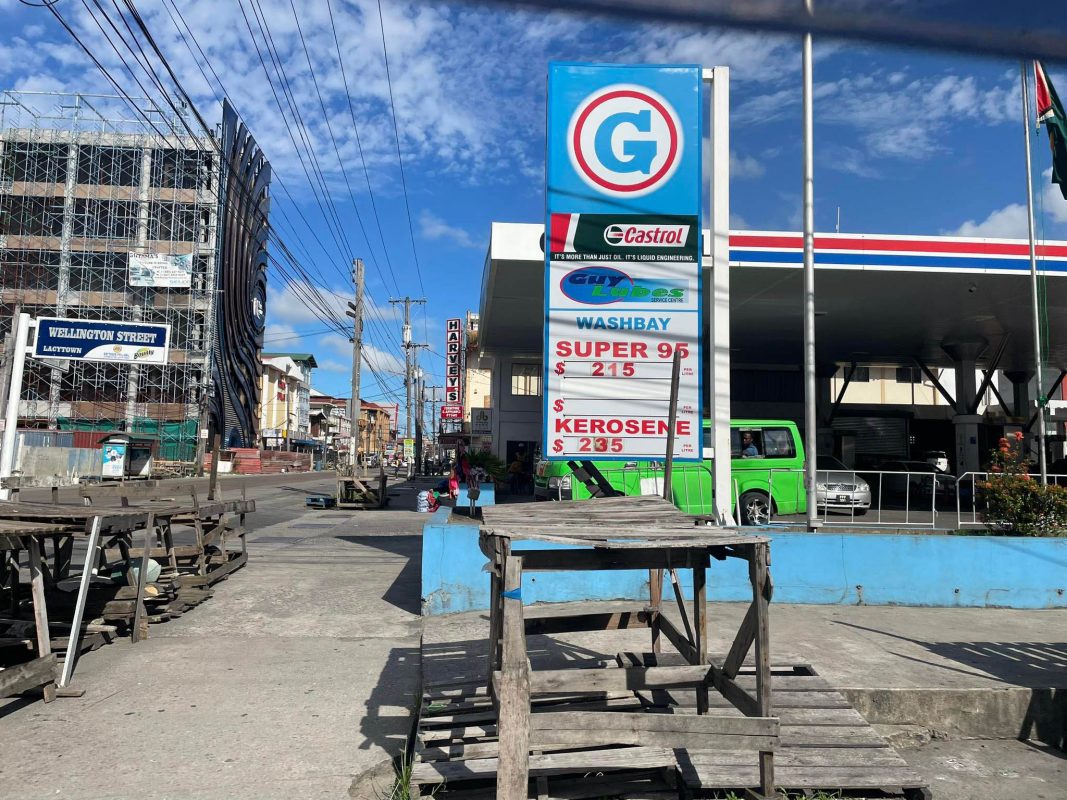GUYOIL yesterday lowered fuel prices in accordance with a government announcement and this immediately saw vehicles queuing up as commuters sought relief from the rise in the cost of living.
Slashed fuel prices took effect yesterday morning at the state-run GUYOIL stations, hours after an announcement by Senior Minister in the Office of the President with Responsibility for Finance Dr. Ashni Singh.
The move by the government was welcomed by commuters and they also expressed hope that other companies such Rubis and Sol will follow suit.
According to a statement on Saturday night from the Ministry of Finance, the prices at the pump charged by GUYOIL will be reduced as follows: gasoline prices by 20 percent from $269 per litre to $215 per litre; and diesel prices by 15 percent from $265 per litre to $225 per litre.
During a visit yesterday to several GUYOIL stations it was observed that lines of vehicles were present. Several vehicle owners who spoke with Stabroek News said the move by government is most welcomed as the prices were getting out of control.
Drivers over the past weeks have been complaining of the increasing fuel prices and the negative impact on their pockets.
Andre (only name given), a lab technician who was in one of the long lines at the Providence Service station said that the reduction will allow him to save close to $10,000.
“I am very happy this happened. I used spend about $30,000 to full up my tank but with this reduction it’s going to cost me about $20,000. I am really grateful,” he said while explaining he drives to work daily.
Another driver, who was also grateful for the reduction and was seen filling up his tank said he wished to see the prices reduced across the board.
“Regardless of the brand, if the government say $215 (per litre) it should be applied across the board,” the driver said.
At the Shell and Rubis service stations, GUYOIL’s biggest competitors, fuel prices remained unchanged.
At both service stations the price for gasoline was $279 per litre.
The statement on Saturday noted that during the first half of 2022, global oil prices surged more than 50 percent, increasing from US$77 per barrel at the end December 2021 to US$120 in June of this year; having risen as high as US$137 per barrel primarily as a result of the Russian invasion of Ukraine. “The (impacts) of the dramatic increases in oil prices were significant and given the interconnected nature of the global economy, translated into higher cost of landing fuel in Guyana,” it noted.
The ministry said in order to mitigate the impact of rising global fuel prices on domestic consumers and the productive sectors in which fuel is a key input, the Government lowered the Excise Tax rate on both gasoline and diesel from 10 percent to 0 percent in March of this year.
“It would be recalled that, previously, during the Budget 2022 presentation, the Government lowered the Excise Tax on both gasoline and diesel from 20 percent to 10 percent so as to minimise the impact of rising global oil prices. The Government has been progressively lowering the Excise Tax rate on both gasoline and diesel, from 50 percent to 35 percent in February 2021, [and] 35 percent to 20 percent in October 2021, in keeping with Government policy to adjust the taxes on fuel, to mitigate the impact of rising fuel prices on the world market.
The statement added that since resuming office in August 2020, the PPP/C Government has implemented a suite of measures to ease cost of living pressures and to improve disposable incomes, in an ongoing effort to address these issues head-on and to mitigate the effects of rising prices globally on all Guyanese citizens. The reduction in excise taxes is one such measure within the wide menu of measures implemented by Government since assuming office.
The International Monetary Fund (IMF) recently called on the government to gradually reverse tax subsidies aimed at easing the cost of living.
“[IMF] Staff broadly supported the authorities’ measures to temporarily ease the burden of higher global commodity prices on the most vulnerable groups of society, given the absence of adequate safety nets. Since tax measures are poorly targeted tools, staff recommended a gradual unwinding of the general subsidies provided through the tax system and moving to full pass-through of international prices to domestic prices since the shock does not appear to be temporary, and therefore other forms of government support are more appropriate. This should be done simultaneously with measures to further develop and strengthen a well-targeted social safety net system,” it said in a report released on Tuesday.








